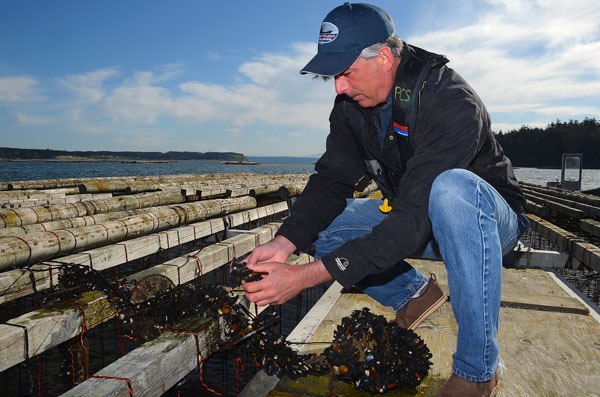Concerned residents and business owners took one last opportunity this week to voice their thoughts about Island County’s Shoreline Master Program.
On Wednesday, the state Department of Ecology held an open house and public hearing in Coupeville.
The agency, charged with reviewing and approving the county’s recently adopted program, will accept written comments for several more weeks, but this was the department’s only scheduled public meeting before Ecology officials make a decision.
Critics didn’t waste the opportunity as more than 35 people attended the three-hour event.
Many of them took to the microphone to complain about specific sections of the program.
AS WITH the many public meetings held last year, the hottest topics concerned aquaculture rules and regulations surrounding existing and future public beach accesses.
Ian Jefferds, owner of Penn Cove Shellfish, testified against changes made in December by the Island County commissioners. Language was added suggesting his family’s mussel farm, in business since 1975, may have to prove that operations are not resulting in “adverse environmental impacts.”
Jefferds said the farm does much to keep the water in Penn Cove clean, and while the rule may be directed at fin fish net pens, he regards the language as an affront to the mussle farm’s efforts.
“This particular regulation is not only misdirected but offensive,” Jefferds said.
He didn’t go into specifics at the meeting, but one example of the farm’s water quality improvement efforts took place in 2010 when the company contributed $6,000 to the Port of Coupeville help with the cost of a pump-out station at Coupeville Wharf.
FIN FISH net pens for non-native species was also controversial.
Following overwhelming public testimony against so-called “fish farms” last year, the county commissioners agreed to ban them outright. However, that prohibition was a source of heartburn for state Ecology.
“We feel it may be too restrictive to accommodate this water-dependent use, which conflicts with some of the key elements of the Shoreline Management Act,” said David Pater, a shoreline planner with Ecology.
Pater is the official reviewing the county’s plan.
ADOPTED BY the state Legislature in 1972, the Shorelines Act requires municipalities to adopt master programs that guide development on and around the waterfront, including lakes and rivers.
The foundation of the legislation is to reduce the impact of development on the environment. One of the chief ways of accomplishing that is by limiting the types of uses to those that cannot exist anywhere else, such as ferry docks or, in this case fish farms.
The agency has long held the position that they are one of a few allowed water-dependent uses and cannot simply be outlawed. But many feel Ecology’s stand is contradictory to the underlying goal of the Act.
STEVE ERICKSON, a founder of Whidbey Environmental Action Network, called the facilities “feed lots” that produce and release massive amounts of untreated sewage into Puget Sound.
He accused state Ecology of being a “captive of the industry,” representing the wishes of lobbyists over the expressed interest of the public on behalf of the environment.
“This is a classic example of what’s called a ‘captive agency,’ where the industry the agency is supposed to regulate has taken over the agency,” he said.
ALSO SPEAKING Wednesday were representatives of the recently-renamed beach access citizen advocacy group, Island Beach Access.
Among them was founder Mike McVay, of Langley.
He expressed concerns that the programs goals for maintaining existing and creating new public accesses may be difficult to enforce.
McVay also questioned why the county’s public access map is not updated — the current version is incomplete and inaccurate, he said.
“This isn’t going to go away,” said McVay, concerning encroachment by private property owners.
“It’s only going to get more competitive and combative.”
He wrapped by thanking Ecology officials for the their time and for their understanding.
“Sorry you have to listen to us bully you like this,” said McVay, earning a round of chuckles from the crowd.
DEADLINE for public comments of the Shoreline Management Plan is 5 p.m., May 24.
They can be mailed to Pater at 3190 160th Ave. S.E., Bellevue, 98008, emailed to david.pater@ecy.wa.gov, or submitted by telephone by calling 425-649-4253.
There are still several more steps in the process and it may be months before the agency issues a decision.


